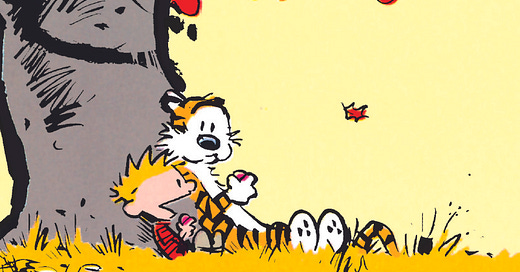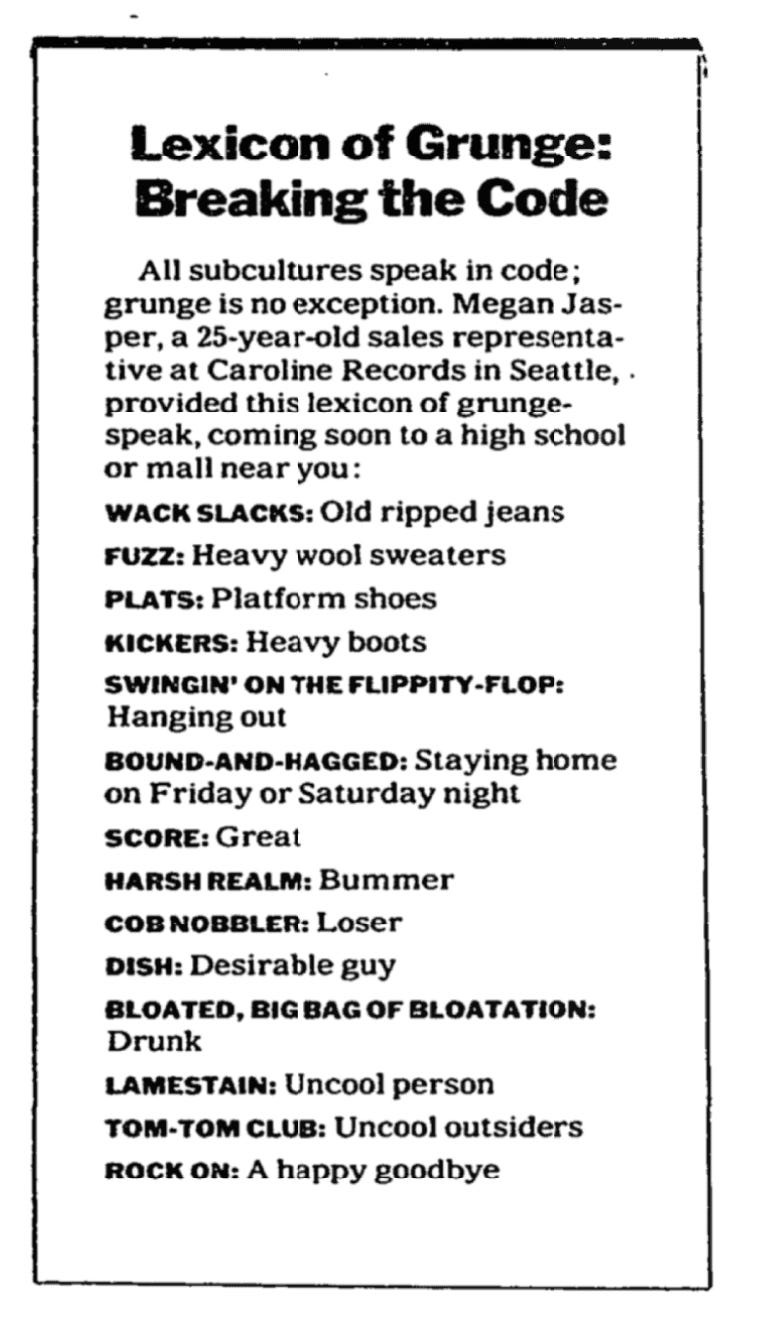Hey, the book’s out. If you haven’t bought it yet, you should. If you have, you should write a (hopefully positive!) review of it on Goodreads or Amazon or both. I hope those of you who have a copy are enjoying it. Also, all bookplates have been mailed out. If you don’t have yours by next week, please email me and let me know.
Also, I’m starting the next one—already!—in the coming weeks, so I only have a few more of these please-buy-the-book entreaties left for you atop the newsletter. I really do think you should buy the book, though. If you like these newsletters, you will like the book.
If you are on the search for a foundational Generation X document, you do not lack for options. The Before Sunrise movies. The books of Cheryl Strayed, David Foster Wallace, Dave Eggers, Elizabeth Wurtzel. Pulp Fiction/Trainspotting/Fight Club/Heathers. Seattle rock, coastal rap feuds, Kurt Loder, Winona Ryder, “Pee-Wee’s Playhouse,” all the usual suspects.
But I’d humbly submit that the piece of generational literature/art that I found the most thrilling upon first discovering it, the thing that made think, “that … now that sums up the way I and the fellow young people I know see the world and our place in it,” was this:
That is the infamous “grunge speak” guide that ran in The New York Times on November 15, 1992, alongside a Styles section story, by a man named Rick Marin (who would later write a book called Cad: Confessions of a Toxic Bachelor) discussing “the grunging of America.” It was a Times Style section piece like Times Style sections pieces for decades before and since—a little silly, a little stilted, a lot beside-the-point and extremely late to the party. But what made this particular Times piece immortal was a 25-year-old Caroline Records employee named Megan Jasper, who, asked by Marin to come up with a “grunge lexicon,” decided to mess with him.
According to a fantastic 2017 piece in The Ringer by Alan Siegel, Jasper, who is now the CEO of Sub Pop Records and still seems pretty awesome, just started making shit up.
She found the idea of codifying the scene’s slang hilarious, mostly because it didn’t exist. When people made such assumptions, there was only one thing to do. “You react by trying to make fun of it,” Jasper said. Earlier that year, British magazine Sky had asked her for a similar glossary. “I gave them a bunch of fake shit,” she said. The nonsense words she suggested ended up in print and caught the eye of members of the band Mudhoney, whose members sprinkled them into a conversation with U.K. music publication Melody Maker.
What a wired Jasper provided Marin was more extensive. She kicked off the list with jokey colloquialisms that had a veneer of authenticity — “lamestain” (uncool person) and “rock on” (a happy goodbye). Soon, she progressed to ridiculous expressions like “swingin’ on the flippity-flop” (hanging out) and “cob nobbler” (loser). “I thought if I said some stuff that sounded kind of believable and some stuff that sounded just outrageous that it would just lead to us laughing about it,” Jasper said. As they spoke, she could hear the sound of Marin typing. Jasper kept waiting for him to ask if she was kidding. He never did.
The prank was an instant sensation: The Ringer piece describes how Jasper started seeing T-shirts printed with the sidebar at Seattle rock shows within days of the story running. And it was, in many ways, the perfect encapsulation of the Gen-X ethos, both then and now: Jaded, self-reflexive, ironic, sneering, but gently—a little too removed from it all to be angry—and, most of all, eager to expose the phonies, the people who were constantly trying to, as Lloyd Dobler put it, sell anything, buy anything, process anything. Rick Marin was trying to package and sell something real—whatever “reality” meant, another central question of Generation X—so people would buy it. This made him the enemy, just another person exposed as someone just trying to sell you something you do not need or want. This made him worthy of mockery. This made you want to mess with him.
And there was no better way to mock him as someone who didn’t get it than to to speak in a language he didn’t understand—even better, one that didn’t actually exist. He had to be turned into a cob nobbler. What’s a cob nobbler? Yeah: Sounds like something a cob nobbler would say. A secret language for the youth, a slang all their own, is a way to insulate one’s self from the outside world: A way to exclude the squares and dopes and bullshit artists, a way to show that you get it in a way that people older than you never could. It is a code. And the harder they try to crack it, well, the more of a lamestain they are.
The problem, of course, with being a young person is that, someday, you won’t be. If you’re lucky, anyway.
******************
“He was rizzing her up,” William said to me this week, after I picked him up from the coffee shop he now hangs out at after he walks home from middle school, where he gathers with his friends in the corner, another preteen in the endless gaggle of them. “He’s got W rizz.”
I nodded, like millions of parents have before, pretending to understand. When your kid is in middle school, I’ve quickly discovered, you find yourself grateful that he’s telling you anything at all.
William said some other things my brain couldn’t compute, but I did find myself writing them down so I could look them up later. My mind immediately went to the grunge lexicon: Was William already sly enough to make stuff up to mess with me?
When I was over at my Waitin’ Since Last Saturday co-host Scott Duvall’s house this week to tape this week’s episode, I asked his daughter, in the seventh grade, if she knew what any of these words meant. She, along with her older brothers, helpfully explained that “Rizz” was short for “charisma,” and to “rizz someone up” was to try to be charm them. (To ask “charm them to what end?” felt like a question I should keep to myself.) Armed with this information, I asked William—and his nine-year-old younger brother, who also seemed to know this terminology, already—if he had “good rizz.”
He rolled his eyes as hard and deep as I did when my parents once asked me why Kurt Cobain’s jeans were so ripped, he’s a rock star, can’t he afford new jeans?
“It’s not good rizz, Dad, jeez,” he said. “It’s W rizz.” It turns out there are three kinds of rizz: W rizz (which appears to be successful rizz), T rizz (which is so-so rizz, not ultimately successful but not embarrassing either), and L rizz (which is a total failure of the flop sweat variety, the sort of rizz I personally associate with most of my teenage years).
He then sat down and explained to me some more. “Sold” is when you’ve screwed something up, like if you miss a big shot in a basketball game, you’ve “sold” it for your team. When he plays sports, he preened, he does much more “slaying.” He told me about “suss,” but I knew what “suss” was already, jeez, William, I’m not that much of a lamestain. He was cackling throughout, the cackle of someone who is talking to a person who is never going to understand it, of someone thrilled to be a part of their own special universe, of someone who is a young person. Every time I tried to use some of the lingo in a sentence—”I tried to rizz her up, but Frank said I sold it because I was being suss”—he and his brother cracked up. “That’s not how it goes, Dad,” they said, because they know everything, because it’s their code and no old, let alone a Dad old, is going to crack it.
Wynn then put an L to his forehead and started dancing, and everybody laughed.
**************
In less than two months, I will be 48 years old. My father turned 48 years old three months after I graduated from college; I had already moved to Los Angeles and was working my first job when my father turned 48 years old. I was just starting to figure out who I was back then, writing the first page of a story that, I’d like to think, is still in the process of being told. My dad probably felt the same way when he was 48. But I didn’t see it that way then. I thought his story was completed—I thought everything moving forward for him was just epilogue. I was living in the present, the world of the Coen Brothers and Quentin Tarantino and Liz Phair and the World Wide Web, and he was in the past. Not only could he not understand me, he wouldn’t have even had the language to do so. He wouldn’t even know what “macking” means.
I would like to say that things are different now. But.
So: Have you seen this?
This is The Arrow, a new site that is advertised as “a site for Gen-X men, by Gen-X men, about the stuff in life that really matters.” Its current stories include:
“The Ultimate Gen X Summer Playlist” (okay, so this is written by my friend Dave Holmes and is actually a pretty great playlist; there are picks from Butch Vig and Jon Wurster and Nick Hornby on here.)
“How a Butt Dial Became My North Star” (all right, this piece is by Dave too, and it’s actually really good)
The Arrow is not some new venture from some new media publisher, looking to capitalize on Gen-X trends, trying to market to us the way we’ve always been marketed to, the way we’ve learned to mock, because, as I might have mentioned, we didn’t want to sell, buy or process anything as a career.
The Arrow is not aimed at Gen-Xers because it is believes we are a unique generation worthy of specific appeal.
It is aimed at Gen-Xers because it is owned by the AARP.
“The Arrow,” a new bi-weekly newsletter from AARP, is designed to help you navigate these landmark years, to make the right decisions both for yourself and for the people closest to you. From fine-tuning your relationships to turbocharging your career, from maintaining your body to making your every moment as a father count, we're here to coach you through.
We are not being marketed to—we are being groomed for our future as the next crop of elderly people. In the end, we spent so much time avoiding fighting off marketing that the only thing left to sell us, the only thing anyone cared to, was old age itself. And our fake lingo, still the greatest joke of Gen-X at all, ended up being understood only by ourselves … which may have made it the most sincere, effective youth lexicon there could possibly be. It worked so well you can still use it when you’re old. As long you don’t mind that no one has ever been listening.
It makes you want to put on your wack slacks for a weekend of being bound and hagged, bloated in the harsh realm. Or is that too suss? Such L rizz.
Here is a numerical breakdown of all the things I wrote this week, in order of what I believe to be their quality.
Michael Oher’s Story Was Always Complicated, New York. Movies aren’t real, people!
Don’t Worry About Who Your Team’s Owner Is, They’re All Bad, New York. Did double duty at the mag this week.
Will Ferrell Movies, Ranked, Vulture. Updated with Strays.
DC Movies, Ranked, Vulture. Updated with Blue Beetle.
The Thirty: Every Team’s Top Pending Free Agent, MLB.com. An instructive guide to your offseason.
How Do Everybody’s Schedules Look the Rest of the Way?, MLB.com. The Orioles are gonna do this.
I Wrote the Power Rankings Again This Week, MLB.com. I consider writing these an exercise not entirely dissimilar to stretching before going on a run.
PODCASTS
Grierson & Leitch, we did our annual mailbag show, as well as discussing Night of the Hunter.
Seeing Red, Bernie and I ran down what to watch down the stretch.
Waitin' Since Last Saturday, weekly shows are back, we previewed the SEC this week.
LONG STORY YOU SHOULD READ THIS MORNING … OF THE WEEK
“Why Bill Watterson Vanished,” Nic Rowan, The American Conservative. This was a thoughtful exploration of the Calvin and Hobbes creator’s demons, and while I think it glosses over a little just how anti-merchandising Watterson really was, it’s a moving, smart piece about what it means to create, and then to know that you have to stop.
ONGOING LETTER-WRITING PROJECT!
This is your reminder that if you write me a letter and put it in the mail, I will respond to it with a letter of my own, and send that letter right to you! It really happens! Hundreds of satisfied customers!
Write me at:
Will Leitch
P.O. Box 48
Athens GA 30603
CURRENTLY LISTENING TO
“Hey Sailor,” The Detroit Cobras. Just your semi-regular reminder of how great the Detroit Cobras were.
Remember to listen to The Official Will Leitch Newsletter Spotify Playlist, featuring every song ever mentioned in this section.
Also, now there is an Official The Time Has Come Spotify Playlist.
Last Saturday was the annual birthday party for my friend Bertis Downs. Every year, he has a fantastic live band play songs from an artist—previous entries: U2, Tom Petty and The Cure—and all of his friends sing along to their greatest hits. This year was David Bowie. I felt it important to go all out: Go big, or go home.
Thus: My “Suffragette City.” My larynx still hurts.
Have a great weekend, all.
Best,
Will








Oh my gosh. That Bowie outfit!
You knocked it out of the park!
The AARP reveal is the plot twist I didn't see coming.